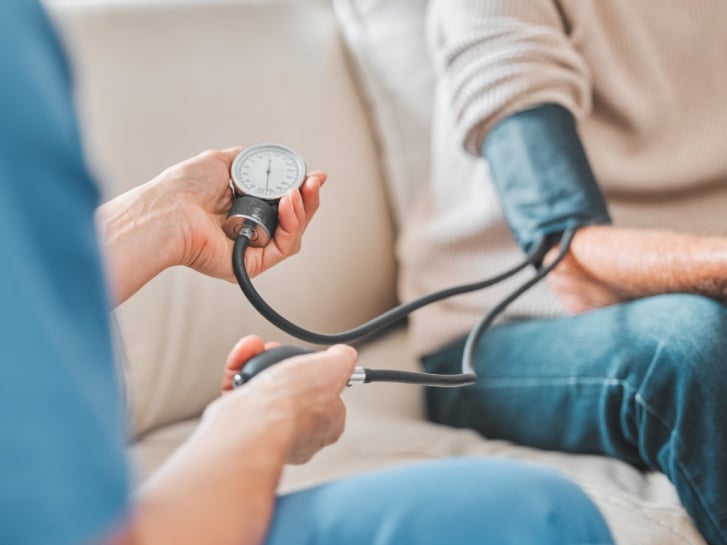
Contraception, pregnancy and pre-eclampsia
If you have a heart condition, or you’re worried about your risk, read our information about contraception, starting a family, and how this affects your heart.
Contraception when you have a heart condition
Contraception can help to plan or prevent pregnancy. No contraception is 100 per cent effective in preventing pregnancy. Some contraception can also help prevent sexually transmitted infections (STIs). It’s important to protect yourself from STIs.
If you have a heart condition, some types of contraception may be more suitable than others.
It’s important to speak to your doctor before starting or stopping contraception. You may feel uncomfortable asking questions, but healthcare professionals are used to talking to people about contraception. If it makes you feel more comfortable, you can ask to take someone with you to your appointment. Your doctor can recommend the best contraception for you, depending on your heart condition.
Common types of contraception include:
- natural family planning
- condoms
- combined contraceptive pill (progesterone and oestrogen)
- progesterone-only pill
- implant
- coil (an IUD or IUS)
- morning after pill (emergency contraception)
- vaginal ring
- sterilisation.
You may not be able to take contraception containing oestrogen if you have a heart condition that makes you more likely to have blood clots or high blood pressure. This includes:
- combined contraceptive pill (oestrogen and progesterone)
- vaginal ring
- contraceptive patch.
Contraception is free in the UK. Use the NHS contraception guide for more information on types of contraception.
What if my parents come to appointments with me?
You may want to talk to your doctor about contraception, but you’re worried about asking in front of your parents. You could:
- ask your parents to stay in the waiting room while you have your appointment
- contact your doctor using email, or other contact details you may have
- ask for a private appointment with your doctor
- visit a free sexual health clinic.
Contraceptive pill and heart risk
An oral contraceptive is medicine you swallow and need to take every day. There are two main types of oral contraceptive pill:
- combined pill, containing the hormones oestrogen and progesterone
- progesterone-only pill.
The combined contraceptive pill may increase your blood pressure. Your doctor or nurse should check your blood pressure regularly while you’re taking the combined pill. If your blood pressure starts to go up, your doctor may suggest you stop taking it.
There is also an increased risk of blood clots when taking the combined pill, although the risk is still low for most people. It can increase the chances of blood clots in the lower leg (DVT), lungs or clots that could cause a heart attack or stroke.
If you’re having side effects or worried about your risk, speak to your doctor. They can recommend a different contraceptive. It’s important not to stop taking contraception without speaking to a doctor first.
Getting pregnant when you have a heart condition
It’s important to talk to your doctor before getting pregnant if you have a heart condition.
Most people who have a heart condition can get pregnant and give birth.
Having a heart condition can affect how your body copes with being pregnant. Being pregnant puts extra strain on your heart and could make your existing heart condition worse.
There are some heart conditions where pregnancy may be unsafe for you and your baby. Your doctor may recommend you not to become pregnant if you have:
- severe heart failure
- pulmonary arterial hypertension
- weakened or enlarged aorta
- previous peripartum cardiomyopathy and your heart has not fully recovered.
You may be at increased risk of complications if you get pregnant and have:
- narrowing of a heart valve
- heart valve replacement
- complex congenital heart disease
- low oxygen levels in your blood.
Speak to your doctor if you have a heart condition and you’re thinking about stopping contraception. They can talk to you about how to reduce the risk of complications if you try to become pregnant. They will also make sure you are closely looked after during pregnancy.
It’s important to speak to your doctor about getting pregnant as they know your individual heart condition and medical information. They can explain any risks and give you more information.
If you become pregnant unexpectedly, speak to your doctor as soon as possible. They can discuss your condition and options with you. In some rare cases where the risk is too high, it may be recommended to end the pregnancy.
Why it’s important to plan ahead
Consultant Cardiologist, Dr Sara Thorne, explains why it's important to plan ahead if you have a heart condition and want to fall pregnant.
Heart medicines and pregnancy
You may worry about medicine you’re taking and any effects on your baby. Your doctor or midwife can look at the medicines you’re taking and whether you need to change any.
Do not stop taking any medicine without talking to a doctor or midwife.
- Find more information on medicines and pregnancy on the medicines in pregnancy website
Pregnancy and inherited or congenital heart conditions
Some heart conditions can be passed down through families (inherited) or develop in the womb (congenital).
If you’re worried about passing your condition on to your children or their risk of developing a congenital heart condition, talk to your heart specialist. If you have not seen your heart specialist for a while, ask your doctor or nurse specialist. You may need to ask your GP to refer you if you’ve been discharged from your heart clinic.
Scans and tests can be arranged to check for congenital heart conditions in your baby. You’ll usually have an ultrasound scan to look for heart conditions during pregnancy.
Some people with a heart condition may be eligible for pre-implantation genetic testing. This is a special type of in vitro fertilisation (IVF) where an egg that has been fertilised with sperm (the embryo) is tested for genetic conditions. Healthy embryos are then put into the womb. Speak to your doctor or nurse specialist to find out if you’re eligible.
If you do not have a heart condition, but you’re worried about your family history and having a baby, speak to your GP. They can help discuss your family history, and whether you’re eligible for genetic testing.
The BHF's Genetic Information Service can help people with a heart condition that runs in their family.
Being pregnant with a heart condition
You’ll be monitored closely by your doctor or midwife during your pregnancy and when you go into labour.
It’s important to go to all your check-ups and appointments so that any changes can be spotted quickly. For example, an increase in your blood pressure. You may find it helpful to take someone with you to appointments. They can help ask questions and take notes at a time when you may be more tired than usual.
You may be asked to take certain medicines to help control your blood pressure and your blood glucose levels if you have diabetes.
If you’re thinking of having an epidural (an injection in your back to stop you feeling pain), discuss this with your doctor. An epidural can cause a large drop in blood pressure.
After you’ve given birth, you and your baby will be invited to a 6 to 8 week check-up appointment. It’s important to go to this appointment so your doctor can check your heart.
Support when you’re pregnant or trying to get pregnant
It’s normal to worry about pregnancy and how it will affect your baby when you have a heart condition. It’s important to take care of yourself and get support if you need it. This will help yours and your baby’s overall health and wellbeing.
If you need someone to talk to, call our Helpline to speak to one of our nurses. You may also find our information on having a baby with a heart condition helpful.
Tommy’s are a charity specialising in support for people when they’re pregnant, find more information in their Pregnancy Hub.
If you continue to feel anxious speak to your doctor, they can help you to find support. You can also refer yourself to the NHS for talking therapies, such as CBT and counselling.
Pre-eclampsia
Pre-eclampsia is a condition that affects some women during or soon after pregnancy.
Pre-eclampsia is when less blood flows between mother and baby. This means the placenta (an organ that provides oxygen and nutrients to your baby through the umbilical cord) does not get enough blood. If pre-eclampsia goes undiagnosed or untreated, it can affect mother and baby.
It is not known exactly what causes pre-eclampsia, but it’s thought to be caused by problems with the placenta.
You may have a higher risk of pre-eclampsia if you’ve had high blood pressure, diabetes or kidney problems before you were pregnant.
Signs and symptoms of pre-eclampsia
The main symptoms of pre-eclampsia should be picked up by your midwife or GP during an antenatal appointment. They are:
- high blood pressure
- high levels of protein in your pee.
Other symptoms may include:
- pain just below your ribs
- severe headaches
- swelling in your feet, ankles, face and hands
- vision problems, such as blurring or flashing
- being sick (vomiting).
If you’re pregnant and have any of these symptoms, contact your doctor, NHS 111 or midwife immediately.
Find more information on pre-eclampsia, including how it’s diagnosed and treated, on the NHS website. You can also get support from Action on Pre-eclampsia.
More information and support
- Find more information in the NHS contraception guide.
- Talk to one of our cardiac nurses by calling our Heart Helpline.
- Read more information on sex and heart conditions.
- Find support and information from Tommy’s, a charity providing expert, midwife-led advice for parents before, during and after pregnancy.
- Speak to other people going through a similar experience in our online community.


Treatments




